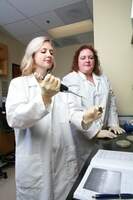Shadowing Guidelines
Shadowing
 Among the most important choices in life is that of a career and life's work. In this
single choice are combined one's values and aspirations, one's self expectations and
assessment of talents, uncertainty, consideration of costs time and money, and concern
about how the choice will have impact on one's personal and family life. The choice
of a career in health care is all of that, and is, in a word, complex.
Among the most important choices in life is that of a career and life's work. In this
single choice are combined one's values and aspirations, one's self expectations and
assessment of talents, uncertainty, consideration of costs time and money, and concern
about how the choice will have impact on one's personal and family life. The choice
of a career in health care is all of that, and is, in a word, complex.
In order to get the most out of your shadowing experience and learning what it's like to be a physician, dentist, or other health care professional, you need to learn not only what the professional with whom you'll be spending time does all day, but also how he or she puts the day together, allows time for the unexpected, stays current in the profession, addresses uncertainty, integrates personal and professional life, and other issues.
There's a lot to learn, both from the professional and from the patients, as well as from the patients families (or their owners if you're spending time with a veterinarian). Experienced health care professionals know that patients and families are important teachers.
The broad question is: What did I learn? We suggest that, among other activities during this experience, you consider these questions:
- What did I learn from this transaction with the patient about:
- The patient's illness
- What's going on in the patient's life that may have importance in dealing with the illness
- The doctor-patient relationship
- The importance of spending enough time
- The importance of engaged listening without interruption
- What did I learn, not only about the patient, but from the patient? What did the patient teach me?
- What did I learn about what it's really like to be a healthcare professional?
We suggest that you keep a journal of your experiences and reflections. Journaling is not only a way to record facts and feelings, but also is an important step in becoming a reflective doctor, a valuable quality.
The journal will also be a helpful resource as you complete your applications to professional school. We suggest also that you share these guidelines with the person(s) whom you are shadowing, so that you can have shared goals.
Courtesy of: Macalester College
Laurence A. Savett, M.D. Pre-health Professions Advisor
Michael Porter, M.Ed. Director, Internship Office
April 2005
